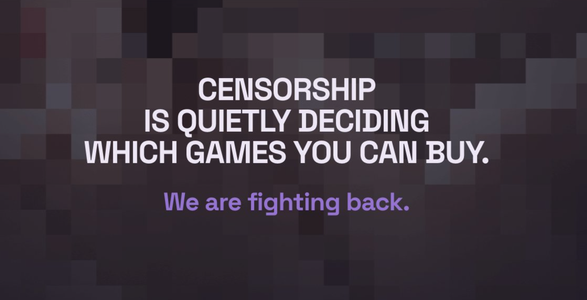Valve has disputed Mastercard's claims that it had not raised concerns over NSFW adult content on Steam.
On August 1, Mastercard released a statement "clarifying recent headlines on gaming content" – in other words, to address claims that Mastercard is among the payment processors putting pressure on gaming platforms, such as Steam and itch.io, to remove or censor NSFW adult content.
"Mastercard has not evaluated any game or required restrictions of any activity on game creator sites and platforms, contrary to media reports and allegations," the statement read.
"Our payment network follows standards based on the rule of law. Put simply, we allow all lawful purchases on our network. At the same time, we require merchants to have appropriate controls to ensure Mastercard cards cannot be used for unlawful purchases, including illegal adult content."
Mastercard isn't saying it puts no restrictions on adult content; the statement seems to imply that the credit card company simply requires that content to be legal.
However, Valve has disputed this statement, telling Kotaku that Mastercard did express concern over adult content on Steam – but did so through intermediaries, rather than directly to Valve.
"Mastercard did not communicate with Valve directly, despite our request to do so," a Valve spokesperson said in a statement to Kotaku on August 1.
"Mastercard communicated with payment processors and their acquiring banks. Payment processors communicated this with Valve, and we replied by outlining Steam’s policy since 2018 of attempting to distribute games that are legal for distribution. Payment processors rejected this, and specifically cited Mastercard’s Rule 5.12.7 and risk to the Mastercard brand."
Rule 5.12.7, laid out in Mastercard's rules, regards "Illegal or Brand-damaging Transactions."
"A Merchant must not submit to its Acquirer, and a Customer must not submit to the Interchange System, any Transaction that is illegal, or in the sole discretion of the Corporation, may damage the goodwill of the Corporation or reflect negatively on the Marks," Rule 5.12.7 states.
It's a lengthy rule that covers the sale of illegal products, but the key part is what Mastercard considers "unacceptable" to sell in connection with its brand.
The rule outlines that sales of products or services (includes images) that are "patently offensive and lacks serious artistic value (such as, by way of example and not limitation, images of nonconsensual sexual behavior, sexual exploitation of a minor, nonconsensual mutilation of a person or body part, and bestiality), or any other material that the Corporation deems unacceptable to sell in connection with a Mark," are a violation of this rule.
Violations of this rule can result in a customer franchise review, audits, fees, and even Mastercard severing ties with the company.
Mastercard's highlighting of this rule to Valve seems to imply that not only does the company regard outright illegal products as a violation, but also any "patently offensive" content that may hurt the Mastercard brand. "Patently offensive" means content that is obviously unacceptable according to community standards, such as explicit sexual or graphic material the average person may consider beyond acceptable limits.
This type of content is not inherently illegal, however, and is protected by the First Amendment of the U.S. Constitution. To be considered obscene, and therefore unprotected by the Constitution, "patently offensive" content must meet all three requirements of the three-part Miller Test.
As per the U.S. Department of Justice, the Miller Test's three prongs are as follows:
- "Whether the average person, applying contemporary adult community standards, finds that the matter, taken as a whole, appeals to prurient interests (i.e., an erotic, lascivious, abnormal, unhealthy, degrading, shameful, or morbid interest in nudity, sex, or excretion);
- Whether the average person, applying contemporary adult community standards, finds that the matter depicts or describes sexual conduct in a patently offensive way (i.e., ultimate sexual acts, normal or perverted, actual or simulated, masturbation, excretory functions, lewd exhibition of the genitals, or sado-masochistic sexual abuse); and
- Whether a reasonable person finds that the matter, taken as a whole, lacks serious literary, artistic, political, or scientific value."
Given Mastercard's wording of its rule, the Miller Test could be used to measure whether certain NSFW games can be classed as "patently offensive" and therefore in violation the company's rules.
Organisations such as the IGDA and UKIE have expressed concern over the crackdown on adult content on gaming platforms due to payment from payment processors, with the IGDA saying it could force some developers into "silence or self-censorship," particularly LGBTQ+ creators.






































